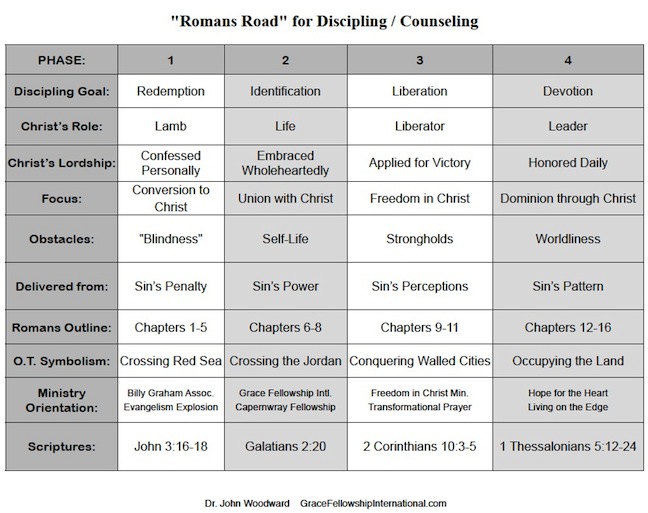(Outline by John Woodward )
The ministry of Exchanged Life counseling needs to be understood in the context of God’s total plan for the believer (Rom 8:28-30).
A. The Christian life begins at conversion and continues with discipleship.
1. The New birth. (Matt 16:26; John 3:3-16)
2. Spiritual growth. (1 Pet 2:4; 2 Pet 3:18)
B. Sanctification is that act of God whereby He sets believers apart to His holiness. There are two aspects of this change:
1. Positional sanctification. (Heb 10:10; 1 Cor 6:11)
2. Progressive sanctification. (Heb 10:14; 2 Cor 7:1)
C. How does justification differ from sanctification?
Justification (Progressive) Sanctification
Legal standing Rom 5:1 Internal condition 2 Cor 7:1
Once for all Gal 2:16 Ongoing process 1 Pet 1:15,16
Complete Rom 8:1 Completed at glorification 1 John 3:2
Equal with all believers Various degrees of progress Heb 5:14
D. There are different theological perspectives on how the believer grows in holiness. What is the most comprehensive answer to the cry of the defeated, struggling child of God? –“O wretched man that I am! Who will deliver me from this body of death?” (Rom 7:24). We believe the Christ-centered, grace-oriented view of Christ as our life is the answer! (Gal 2:20)
“For if when we were enemies we were reconciled to God through the death of His Son, much more, having been reconciled, we shall be saved by His life“(Rom 5:10).
E. Our view of progressive sanctification is foundational to our view of the purpose, goals, methodology, and approach of counseling. Consider this analysis from a prominent secular counselor:
“It is my conviction that our views of human nature and the
basic assumptions that undergird our views of the therapeutic
process have significant implications for the
way we develop our therapeutic practices. I am also
persuaded that, because they do not pay sufficient
attention to their philosophical assumptions, many
practitioners operate as though they had no set of assumptions
regarding their clients. In my opinion, a central
task is to make our assumptions explicit and conscious,
so that we can establish some consistency between our
beliefs about human nature and the way we implement our
procedures in counseling or therapy. ”
–Gerald Corey, Theory and Practice of Counseling and Psychotherapy (Brooks/Cole Publishing Co., 1977), 185.
How do the various approaches to counseling reflect their basic assumptions?
How should our discipleship perspective affect our approach to biblical counseling?
F. An outline of the book of Romans points to four phases or stages in the process of experiencing and expressing the righteousness of God.

1. The theme of Romans: “For I am not ashamed of the gospel of Christ, for it is the power of God to salvation for everyone who believes, for the Jew first and also for the Greek. For in it the righteousness of God is revealed from faith to faith; as it is written, ‘The just shall live by faith.'” (Romans 1:16-17).
The structure of Romans
How God imputes His righteousness chs 1-5
How God imparts His righteousness chs 6-8
How God’s plan is vindicated as righteous chs 9-11
How God’s righteousness is to be practically expressed chs 12-16
This structure can also be a useful construct to perceive four phases in the biblical counseling process. (Stages 2-4 are not mutually exclusive, nor sequentially restricted.)
3. Exercise for Using the “Four Phases” Paradigm
Which of the four phases (see chart) phase is the primary aim of the following with ministry tools?
Model Phase
a. Spirituotherapy _____
b. Nouthetic counseling _____
c. The “7 Steps to Freedom” _____
d. Evangelism Explosion _____
Which of the four phases most directly relates to the following counseling situations:
e. has a negative image of God’s attributes? ___
f. thinks that they are saved by keeping the 10 Commandments? __
g. is frustrated in their attempts to live an abundant life? ___
h. is a mature believer but does not know about the principles of handling their finances? ____
i. is semi-religious and can’t remember if or when they received Christ as Savior? ____
j. thinks that they are just a forgiven sinner, trying to merit their heavenly Father’s acceptance? ____
k. is a parent worn out because their two year old is running their home? ____
l. is a woman who is bitter about the harsh way her mother raised her? ____
m. is a depressed believer who cannot overcome his sense of inadequacy? ____
Key: answer a – phase 2; b-4; c-3; d-1; e-3; f-1; g-2, h-4; i-1, j-2; k-2/4; l-3; m-2
An audio lecture is online here: https://gfiworld.sermon.net/main/main/10549587
JBW 1/2000

















